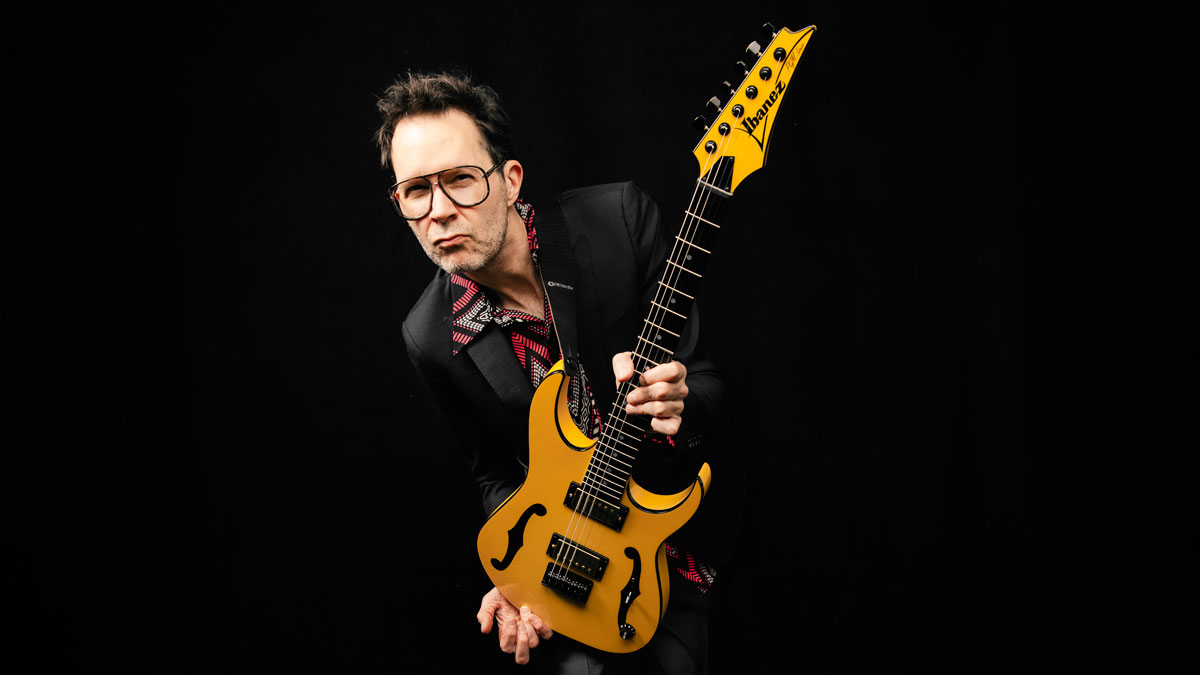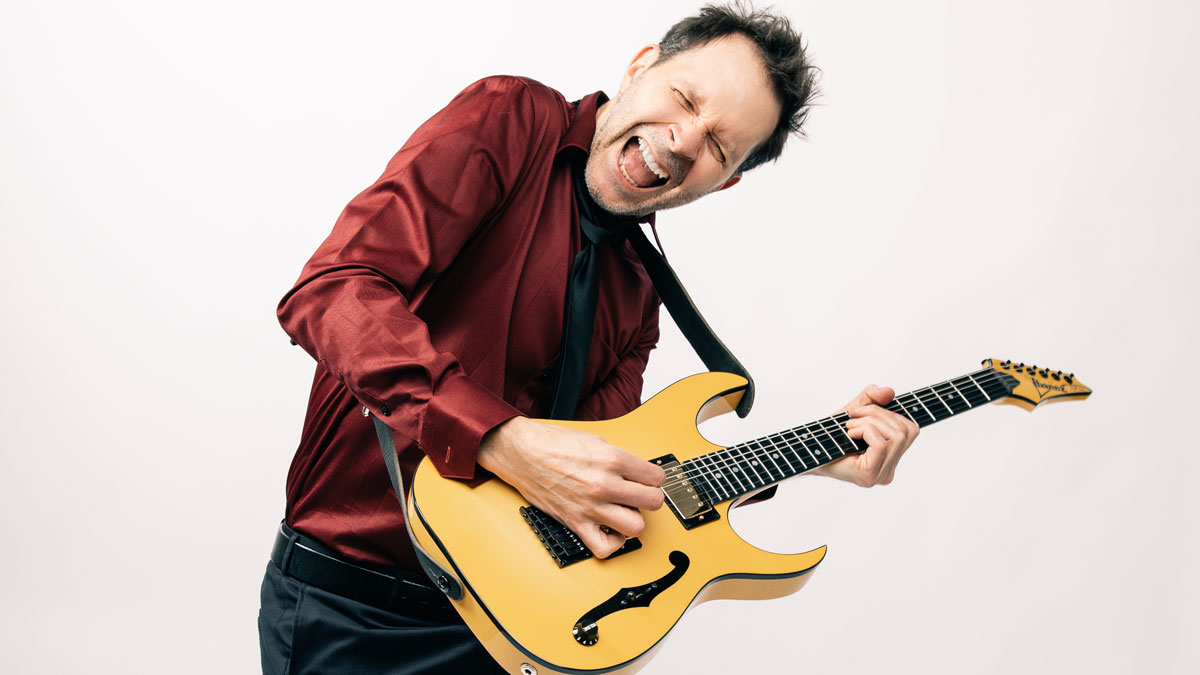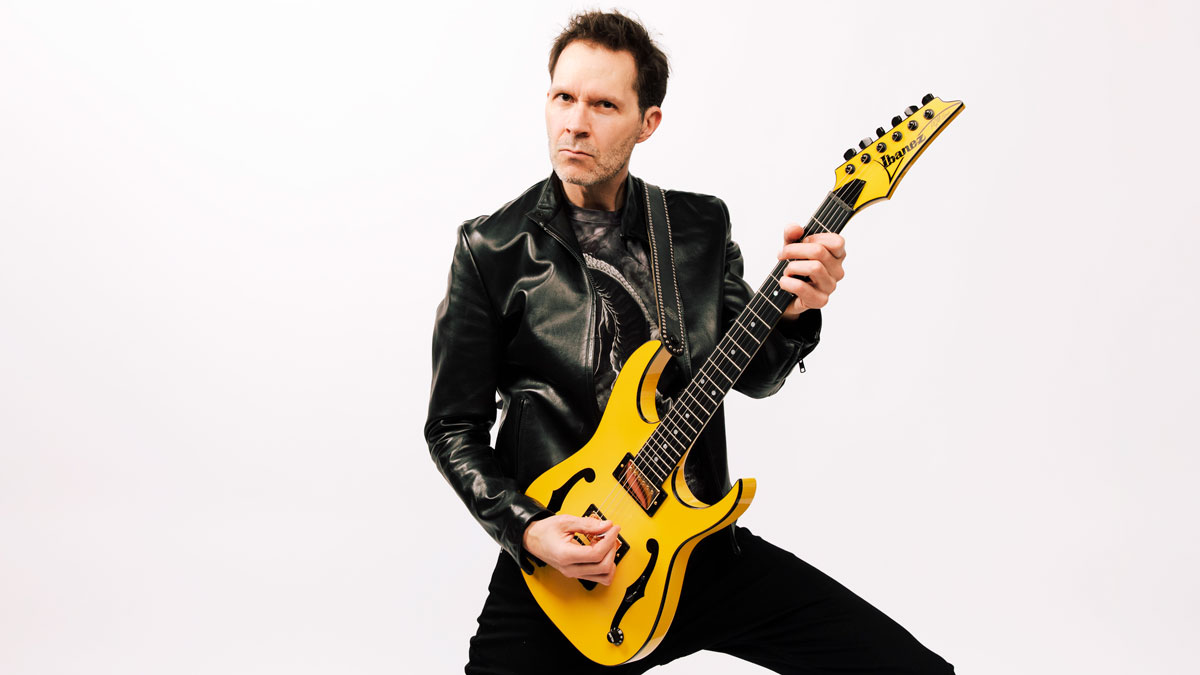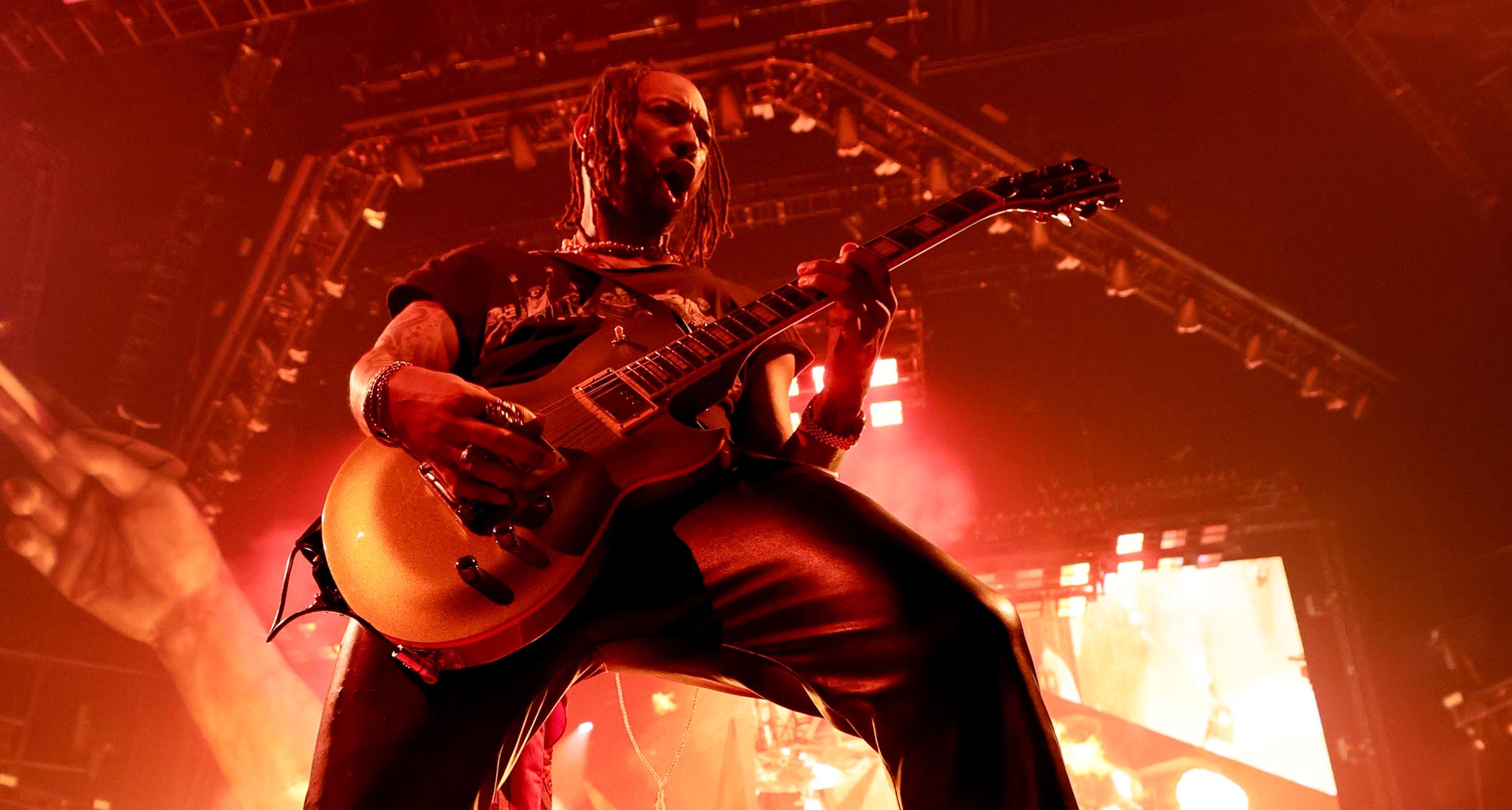Paul Gilbert reveals the surprising guitars he used to emulate Ronnie James Dio's voice, the lead that took 100 takes and his grand guitar solo plans for Mr. Big's farewell tour
The much-loved virtuoso details his approach to tackling parts by Ritchie Blackmore, Tony Iommi and Vivian Campbell for The Dio Album, snapping up vintage Ibanez guitar bargains, and the younger players who are catching his ear

All the latest guitar news, interviews, lessons, reviews, deals and more, direct to your inbox!
You are now subscribed
Your newsletter sign-up was successful
Since his earliest days as a teenage sensation, then onward and upward with Racer X and Mr. Big, Paul Gilbert has captivated audiences with a striking combination of searing theatrics and hyper-fluid virtuosity.
As one of the preeminent players of the '80s, Gilbert found himself on top of the world with Mr. Big, as albums such as Mr. Big (1989), Lean into It (1991), and Bump Ahead (1993) found smash success. Still ever-curious, Gilbert played rover, leaving Mr. Big in 1998 and embarking on a successful, hyper-varied solo career.
In the years since, Gilbert has weaved in and out of the band, taking the stage with his former cohorts for successful reunion tours and even a few more records. Not a lot has changed for Gilbert to that end. The veteran guitarist is still brandishing an array of Ibanez six-strings and undertaking musical endeavors across a broad spectrum.
And while news of yet another, and purportedly final, Mr. Big reunion has dominated headlines of late, Gilbert's latest solo record, The Dio Album – which covers a suite of Ronnie James Dio classics - is quite the treat, too.
"The first time that I heard Man on the Silver Mountain on the radio, while I thought it was cool, I just sort of passed it by," Gilbert recalls. "At the time, I didn't know who the band or the singer was; it was just a cool song, and I moved on. And then, a couple of years later, I heard Neon Knights on the radio – that made me stop and go, 'I gotta find out who that is.'"
"Of course, I was a Sabbath fan, but the Sabbath that I knew was with Ozzy," Gilbert continues. "I didn't know Dio was in Sabbath then, so I thought what I heard must have been a new band. Once I heard Neon Knights, though, I got very deep into the Heaven and Hell record and loved all of it. So, I loved that music back then, which is a big reason I decided to take this on now."
With The Dio Album in the can, and with the beginning of Mr. Big's final jaunt looming, Paul Gilbert dialed in with Guitar World to talk about the importance of Ronnie James Dio's music, his love for cheap – but vintage – Ibanez guitars, deploying a plethora of pedals and amps in search of fleeting tones, and his musings on all things Mr. Big in the modern era.
All the latest guitar news, interviews, lessons, reviews, deals and more, direct to your inbox!
What sort of approach did you deploy when recording The Dio Album?
"Well, all the solos for those songs have these classic, melodic and thematic moments. So, the worst thing I could have done would be to take songs that might have notes hung in space and decide to make it my own, plow through them, and shred like crazy. To me, that would have been the wrong choice.
"Instead, I let my instincts tell me what needed to be done. If the guitar player was doing something that had an important theme, where they're going for it, and stirring up some energy by playing high-energy, fast licks, those are the moments where I felt like I couldn't copy them.
"Even if I wanted to, I couldn't copy them because I think every fast guitar player has their own touch and patterning. If I tried to copy that, it would be disappointing, so I used that as an opportunity to throw my own patterns in and put my own stamp on things. But I found that it could be a little tricky because, within one solo, there's a lot of toggling back and forth. I had to find that balance, which wasn't easy to master."
Which track proved the most challenging?
"The solo that took me the most takes to get right was the opening track, Neon Knights. I probably did 100 takes of that solo, because there were little parts that were thematic, and I couldn't mess with them. So, that one took me a long time to navigate; plus, the chord changes are crazy.
"You'd think that as a metal band, Sabbath wouldn't be too crazy, right? Well, there are all these crazy major and minor seventh chords, which is like opening the jazz door – not easy to master. So, that was challenging to get, and while I was so happy when it was done, man, it was a real journey."

On the other end of the spectrum, did any come together immediately?
"One of the easier ones for me was Kill the King, which came together on the first take. But I had been practicing that one for a bit, so I knew what I wanted to do with it. I had to work on it to decide where I wanted to go with it, because the live and studio versions of different.
"With the live version, Ritchie [Blackmore] just threw caution to the wind, and he wasn't trying to be accurate. On that recording, he was painting with a big brush, probably throwing the guitar over his shoulder and all this crazy stuff.
"So, with that version, it's not so precise, and I bet he played the solo differently from night to night. Having said all that, the solo for Kill the King is very loose, and I probably took the most liberty on that one. I just thought that since it's such a high-energy song, I wanted to let it rip. And I'd been working on my ripping licks the week before, so the first take was the best one I did. I still laid down a couple more takes, but they weren't nearly as good. So, I kept the first take, which you hear on the album."
Of the many guitarists Dio played alongside, which would you say influenced you most?
"When we talk about guys like Ritchie Blackmore, Tony Iommi, and Vivian Campbell, they all influenced me. But Tony Iommi probably had the most significant influence on me, because when I was a kid, his music seemed like something I might be able to play. His solos were great, and I knew what a power chord was, and I felt like I could do it. But when I heard Blackmore, I didn't even know where to begin. There was no way I could copy that stuff as a 12-year-old, so I said, 'Let's save that for later and try this other stuff.'
"And when we talk about a player like Vivian Campbell, I wouldn't even try to figure him out because the soul of what he was doing was imprinted so deeply in that music. His stuff did have its own fingerprint on it, and it would be way too much work, and I didn't think the result would be good, so I didn't concentrate on that. Vivian Campbell did some licks kind of like Gary Moore; I can't do things that way. I could sit there with a metronome for two decades but still wouldn't get it. It just doesn't fit my physiology."
That begs the question: how did you approach the Vivian Campbell solos which appear on The Dio Album?
"The same way I'd approach the Gary Moore stuff in the past. I worked out a different way to get the same notes and same patterns. The way I did it was that I was stretching out three notes on a string, which is this giant stretch. And then I reached down and got the last note on another string. And so, I'm getting the same notes, but I can play with ease, smoothness, and comfort. It maybe gives it a little bit of a different character, but I think that's a better choice than me doing a bad version."
What guitars did you use as you were recording?
"Because I was in my home studio and had my guitar collection, I used way more gear than needed just because it was fun [Laughs]. I'd be messing around during each song, and it was like I was playing with toys. But one of the main discoveries came when I tried to imitate Dio's vocals while using vowels. I'd have to find ways to get guitar sounds to match the way he pronounced certain words those two words, and I found that a lot of that could be imitated by using pick harmonics. And by not using pick harmonics, depending on the song and the vocal.
"Now, I say that because I had more room for pick harmonics with my guitars that have a smaller number of frets. And so, I've been collecting some early '80s Ibanez stuff recently because it's cheap, and I discovered Reverb during the pandemic [Laughs]. I had to give myself something to look forward to, so I started snapping up $400 Ibanez Roadstar guitars and things like that. Of course, I'd fix them up and had some of them re-fretted, but I ended up using them on this Dio album.
"There's one in particular called the RS315, and it's got an excellent tremolo bridge with a lot of resonance. It's kind of like a Strat; it has 21 frets and a really round neck radius, which at first, was horrifying because I couldn't get the action low. Because if you lower the action every time you bend, the thing frets out, but as it turned out, the higher action worked great, and there was a lot of resonance. And with the 21 frets, I had pick harmonics for days. So, the RS315 was the main guitar for that reason."

How about pedals?
"Like I said before, I had my whole collection in front of me, so I had a lot of fun there, too. I have a bunch of JHS stuff, and I really like their overdrive pedals. I've got my signature JHS overdrive – the PG14, and I used that, of course. But I also used what's called the JHS Overdrive Preamp, which proved very handy for the Vivian Campbell stuff. I found that if I ran the Overdrive Preamp into a Xotic AC Booster, I could find that classic, early-'80s, heavy metal distortion sound that I love.
"And then, for the Blackmore stuff, I had to take a different approach. To me, Blackmore's stuff was never super-fuzzy; he had a relatively clean but somewhat compressed sound. I think a lot of that compression came from just having a Strat running through a 200W Marshall with power tubes, but I had to find a way to match it.
"So, what I did – and I'd never tried this before, but it worked so well – was I took a Boss CS-3 Compression Sustainer and ran it into a JHS Kilt V2 Overdrive. I did that for Kill the King, Starstruck, and tracks like that. I got that slight distortion, but still clean, with a lot of sustain."
What combination of amps did you work with?
"I had my Princeton Reverb and kept it right next to me while recording. I like to have my amp in the room with me so that I can feel the speakers a little bit. I don't like to hear it through the studio monitors. So, I had a Princeton Reverb running clean, just for variety, and sometimes, Marshall JTM45, and I'd run that into a Randall Isolation Cabinet. I opened it a bit so I could feel it in the room, and we put a mic inside and outside to get a little rumble.
"Most of the amps I ran clean, but the one amp I would use for distortion was a Fender Vibrolux Reverb, a combo. The funny thing was that years ago, I blew up the speakers on it, so I sawed the chassis in half, got rid of the speakers, and then glued the bottom back on to make it a head. Then I ran that into a THD Hot Plate, which I don't think they even make anymore. It's just a speaker attenuator, which I ran into an ISO cabinet at a reasonable volume, giving that nice, honky midrange that I wanted when I cranked it up."
Are there any young guitarists who have caught your ear recently?
"I really like Eric Johnson and Ty Tabor [Laughs]. To me, those are the new guys. At least, it feels that way, doesn't it? I usually like young guys that sound like old guys. One that comes to mind is Kingfish. I think his real name is Christone Ingram, but he goes by Kingfish. I like him, and he's so good, but again, what attracted me to him is he sounds like Freddie King.
"When he bends a note, it's just frightening. He's got that special type of physical control that not many guys have, so I like what he does. Whenever I hear him bend a note, I think, 'Man, I gotta work on my vibrato.' He's such an authority on that, and it's nice to hear. Aside from that, I like Jared James Nichols, who, again, is a bluesy type of guy. I have a hard time leaving that space; it's my anchor. If I get too far away from that, I start to feel a drift."
Why is now the right time to fire Mr. Big's engine again?
With teaching, I've got to show people structure, locking into a groove, and paying attention to the song. All of that has made me realize that freeform guitar solos can be pretty dangerous, but at the same time, I think it could be time to bring it back
"I think every year that goes by, we consider it. And now that Covid is hopefully over and the world is somewhat normal, it seems like a good time to pull together, pour all our energy into it, and do it the right way one last time. And I'm excited to do the Lean into It record in its entirety, which is one of our big goals on this tour.
"We've never done that before, and I think that will be a cool challenge for us and a good treat for the audience, too. I also love the drummer that we've got in Nick DiVirgilio. He reminds me a lot of Pat Torpey in terms of his groove, but also as a lead time. That was a big part of what Pat Torpey brought to Mr. Big, so we needed that from a drummer."
How do you prepare for a tour of this magnitude?
"So, the thing that I've been thinking about the whole time is that whenever we've done anything with Mr. Big, Billy always does this amazing freeform bass solo. Now, I haven't been in the world of freeform guitar solos in a long time, especially as a teacher. With teaching, I've got to show people structure, locking into a groove, and paying attention to the song.
"So, honestly, all of that has made me realize that the freeform stuff can be pretty dangerous, but at the same time, I think it could be time to bring it back. So, I'm gonna give myself that assignment, and I'm going to try and think in terms of inspired, freeform guitar solos. I'll have to figure out what I can bring to the table there – that's the assignment. I haven't started yet; it's just an idea. But I'm curious about what I'll be able to conjure up there."
Which of Mr. Big's songs is the most challenging for you?
"Well, one of the biggest challenges is the solo for Daddy, Brother, Lover, Little Boy (That Electric Drill Song) because you can't mess with it. It's really fast, but it's also really structured. So, there's just no way I'm gonna improvise that. It's gotta be that solo, and it requires that I do fast, clean, alternate picking with a lot of clarity that locks into the groove. And, again, that's not something that I work on very much anymore. But that's my job up there, and I have to make it happen.
"I always dread metronome work, but I may actually have to pull out the metronome and just get to work on that one. Although it's funny because a lot of times, as soon as I think I've got the right hand down and figured out, now it's the left that I've to work on. It's very counterintuitive that way, so you always have to pay attention to both."
What guitars will you bring on the road with Mr. Big?
We're going to be pouring all our collective energy into this thing and go out and do it the right way, one last time
"I wish I could take all of them, but that gets expensive [Laughs]. Plus, I'd have to wait longer in line at the airport for everything. I guess I'll probably take some PGM3-WH models out, because that's probably the guitar associated with the old days, and it works. Those guitars feel right for Mr. Big, so I have to go with those. Whenever I play some of the more challenging stuff, it feels a bit easier and better on a PGM for whatever reason."
A lot of bands embark on "farewell tours", only to come back years later. Is this truly it for Mr. Big?
"Well, we're going to take the time to ensure we get to everyone we can. We're planning on doing two legs. We're doing a summer tour in Japan and Asia, and then we'll start up again in 2024. At that point, we'll try and hit everywhere else.
"But to me, that's our intention – for this to be the final Mr. Big tour. We're going to be pouring all our collective energy into this thing and go out and do it the right way, one last time. All of us have so much other stuff going on that, to me, making this the last time feels right and makes sense."
- The Dio Album is out on April 7 via Music Theories Recordings/Mascot Label Group.
Andrew Daly is an iced-coffee-addicted, oddball Telecaster-playing, alfredo pasta-loving journalist from Long Island, NY, who, in addition to being a contributing writer for Guitar World, scribes for Bass Player, Guitar Player, Guitarist, and MusicRadar. Andrew has interviewed favorites like Ace Frehley, Johnny Marr, Vito Bratta, Bruce Kulick, Joe Perry, Brad Whitford, Tom Morello, Rich Robinson, and Paul Stanley, while his all-time favorite (rhythm player), Keith Richards, continues to elude him.

